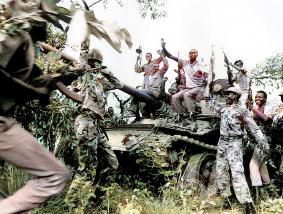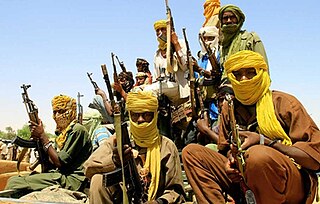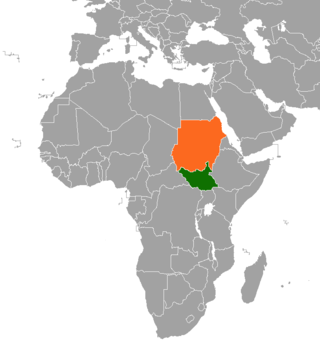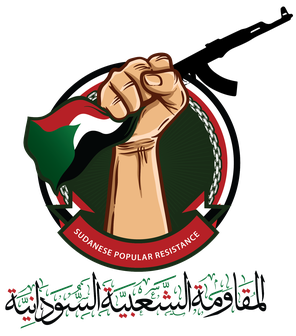
Sudan, officially the Republic of the Sudan, is a country in Northeast Africa. It borders the Central African Republic to the southwest, Chad to the west, Egypt to the north, Eritrea to the northeast, Ethiopia to the southeast, Libya to the northwest, South Sudan to the south, and the Red Sea to the east. Sudan has a population of nearly 50 million people as of 2024 and occupies 1,886,068 square kilometres, making it Africa's third-largest country by area and the third-largest by area in the Arab League. It was the largest country by area in Africa and the Arab League until the secession of South Sudan in 2011; since then both titles have been held by Algeria. Sudan's capital and most populous city is Khartoum.

The Sudanese Armed Forces are the military forces of the Republic of the Sudan. In 2011, IISS estimated the forces' numbers at 109,300 personnel. The CIA estimates that the SAF may have up to 200,000 personnel. While Al Jazeera Media Network report that's the Sudanese Armed Force have around 300,000 personnel.
The Janjaweed are an Arab nomad militia group from the Sahel region that operates in Sudan, particularly in Darfur, and eastern Chad. They have also been speculated to be active in Yemen. According to the United Nations definition, Janjaweed membership consists of Arab nomad tribes from the Sahel, the core of whom are Abbala Arabs, traditionally employed in camel herding, with significant recruitment from the Baggara.

The Second Sudanese Civil War was a conflict from 1983 to 2005 between the central Sudanese government and the Sudan People's Liberation Army. It was largely a continuation of the First Sudanese Civil War of 1955 to 1972. Although it originated in southern Sudan, the civil war spread to the Nuba mountains and the Blue Nile. It lasted for almost 22 years and is one of the longest civil wars on record. The war resulted in the independence of South Sudan 6 years after the war ended.

The Justice and Equality Movement is an opposition group in Sudan founded by Khalil Ibrahim. Gibril Ibrahim has led the group since January 2012 after the death of Khalil, his brother, in December 2011. The JEM supported the removal of President of Sudan, Omar al-Bashir and nation-wide government reform.

The Sudan Liberation Movement/Army is a Sudanese rebel group active in Darfur, Sudan. It was founded as the Darfur Liberation Front by members of three indigenous ethnic groups in Darfur: the Fur, the Zaghawa, and the Masalit, among whom were the leaders Abdul Wahid al-Nur of the Fur and Minni Minnawi of the Zaghawa.

The South Sudan People's Defence Forces (SSPDF), formerly the Sudan People's Liberation Army (SPLA), is the army of the Republic of South Sudan. The SPLA was founded as a guerrilla movement against the government of Sudan in 1983 and was a key participant of the Second Sudanese Civil War, led by John Garang. After Garang's death in 2005, Salva Kiir was named the SPLA's new Commander-in-Chief. As of 2010, the SPLA was divided into divisions of 10,000–14,000 soldiers.

The Sudan People's Liberation Movement–North, or SPLM–N, is a political party and militant organisation in the Republic of the Sudan, based in the states of Blue Nile and South Kordofan. The group's armed forces are formally known as the Sudan People's Liberation Army–North or SPLA–N. In 2011 when South Sudan broke away from Sudan to form a new country, most of the Sudan People's Liberation Movement (SPLM) and Army (SPLA) left with it, leaving units remaining across the border in Sudan to form the SPLA–N.

The Sudanese conflict in South Kordofan and Blue Nile was an armed conflict in the Sudanese states of South Kordofan and Blue Nile between the Sudanese Armed Forces (SAF) and the Sudan People's Liberation Movement–North (SPLM-N), a northern affiliate of the Sudan People's Liberation Movement (SPLM) in South Sudan. After some years of relative calm following the 2005 agreement which ended the second Sudanese civil war between the Sudanese government and SPLM rebels, fighting broke out again in the lead-up to South Sudan independence on 9 July 2011, starting in South Kordofan on 5 June and spreading to the neighboring Blue Nile state in September. SPLM-N, splitting from newly independent SPLM, took up arms against the inclusion of the two southern states in Sudan with no popular consultation and against the lack of democratic elections. The conflict is intertwined with the War in Darfur, since in November 2011 SPLM-N established a loose alliance with Darfuri rebels, called Sudan Revolutionary Front (SRF).
The Local Coordination Committees of Syria are a network of local groups that organise and report on protests as part of the Syrian uprising. In June 2011, the network was described by The New York Times as beginning to "emerge as a pivotal force" in Syria. As of August 2011, the network supported civil disobedience and opposed local armed resistance and international military intervention as methods of opposing the Syrian government.
The Department of National Defence is the department of the Government of Canada which supports the Canadian Armed Forces in its role of defending Canadian national interests domestically and internationally. The department is a civilian organization, part of the public service, and supports the armed forces; however, as a civilian organization is separate and not part of the military itself. National Defence is the largest department of the Government of Canada in terms of budget, and it is the department with the largest number of buildings.

The Heglig Crisis was a brief war fought between the countries of Sudan and South Sudan in 2012 over oil-rich regions between South Sudan's Unity and Sudan's South Kordofan states. South Sudan invaded and briefly occupied the small border town of Heglig before being pushed back by the Sudanese army. Small-scale clashes continued until an agreement on borders and natural resources was signed on 26 September, resolving most aspects of the conflict.

The Libyan National Army or the Libyan Arab Army is a component of Libya's military forces which were nominally a unified national force under the command of Field Marshal Khalifa Haftar when he was nominated to the role on 2 March 2015 by the House of Representatives, consisting at the time of a ground force, an air force and a navy.

The Rapid Support Forces is a paramilitary force formerly operated by the Government of Sudan. The RSF grew out of, and is primarily composed of, the Janjaweed militias which previously fought on behalf of the Sudanese government. Its actions in Darfur qualify as crimes against humanity in the opinion of Human Rights Watch.

Abdel Fattah al-Burhan Abdelrahman al-Burhan is a Sudanese army general who is the de facto ruler of Sudan. Following the Sudanese Revolution in April 2019, he was handed control of the military junta, the Transitional Military Council, a day after it was formed, due to protesters' dissatisfaction with the establishment ties of initial leader Ahmed Awad Ibn Auf. He served as chairman of the TMC until a draft constitutional declaration signed with civilians went into effect on the 17th of August and a collective head of state Transitional Sovereignty Council was formed, also to be initially headed by al-Burhan.

Mohamed Hamdan Dagalo, generally referred to mononymously as Hemedti, Hemetti, Hemeti, or Hemitte, is a Janjaweed leader from the Rizeigat tribe in Darfur, who was the Deputy head of the Transitional Military Council (TMC) following the 2019 Sudanese coup d'état. Since 2013, Hemetti has commanded the Rapid Support Forces (RSF). He was considered by The Economist to be the most powerful person in Sudan as of early July 2019.
The Sudanese resistance committees or neighbourhood committees are informal, grassroots neighbourhood networks of Sudanese residents that started organising civil disobedience campaigns against the government of Omar al-Bashir in 2013 and became a major organised network playing a key role during the Sudanese Revolution.

The Al-Fashaga conflict was a conflict between Sudan and Amhara militants from Ethiopia in the disputed border region of al-Fashaga. Since 2008, Ethiopia has dropped all claims to the al-Fashaga as long as Sudan allowed Ethiopian farmers and militants to stay in the area undisturbed. With the outbreak of the Tigray War, Sudanese forces were able to move into the region due to an agreement with Ethiopia just three days before. When Amhara militants left to assist the federal government in the war, Sudanese forces started to drive out Ethiopian farmers, effectively breaking the 2008 compromise. Ethiopia has also accused Sudan of killing Amhara farmers. The Government of Sudan claims the involvement of ENDF and Eritrean troops in the border dispute while the Ethiopian government denies this and regards the conflict as skirmishes between Sudanese forces and ethnic militias from the Amhara region. External media coverage has tended to conflate the Amhara militias with federal soldiers from the Ethiopian National Defence Forces (ENDF). There is some evidence to suggest that the ENDF has been involved in the conflict, although the capacity in which they are doing so is unclear. It is likely that they have had a peripheral role in the actual fighting.

The Al-Bara' ibn Malik Battalion, also spelled as El-Baraa Ibn Malik or Abaraa Iban Malik, is a Sudanese Islamist militia that emerged within the complex network of militias and armed factions in Sudan, operating within the Sudanese Popular Resistance movement. The militia is linked to the Popular Defence Forces, a paramilitary group that was active during Bashir regime era, and currently known as the 'Shadow Battalions'. It has been active in supporting the Sudanese Armed Forces (SAF) in their ongoing battles against the Rapid Support Forces (RSF). It also has ties with the Islamic State.

The Popular Resistance, also known as the Popular mobilisation, is a conglomerate of armed factions in Sudan that was formed in response to the ongoing conflict between the Sudanese Armed Forces (SAF) and the Rapid Support Forces (RSF). This conflict, rooted in a power struggle within the country's military structure, erupted into full-scale war on 15 April 2023.















